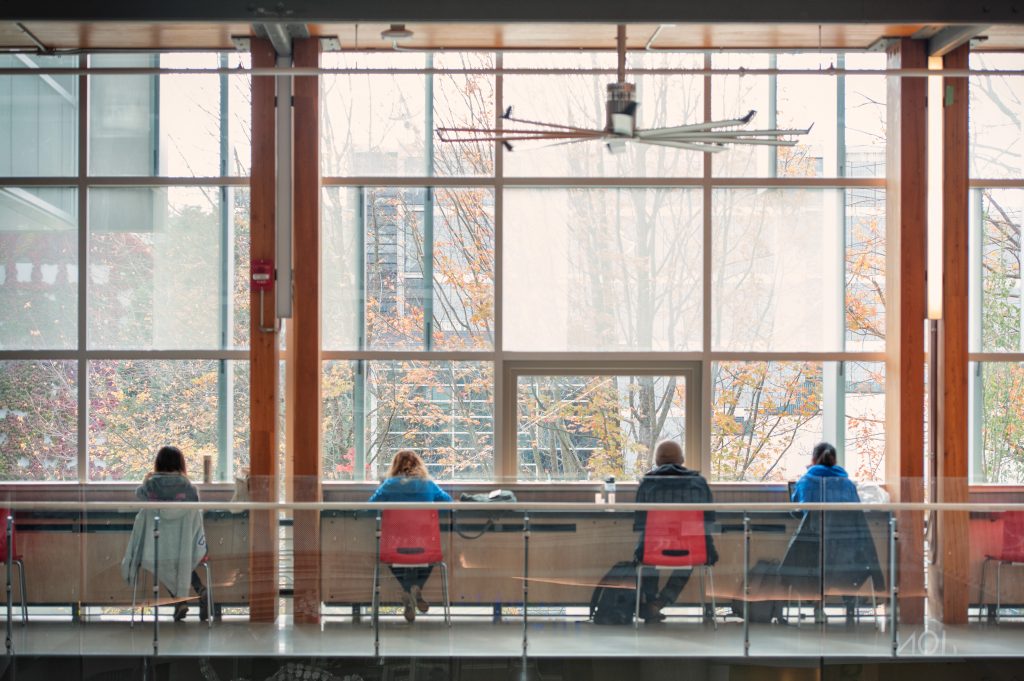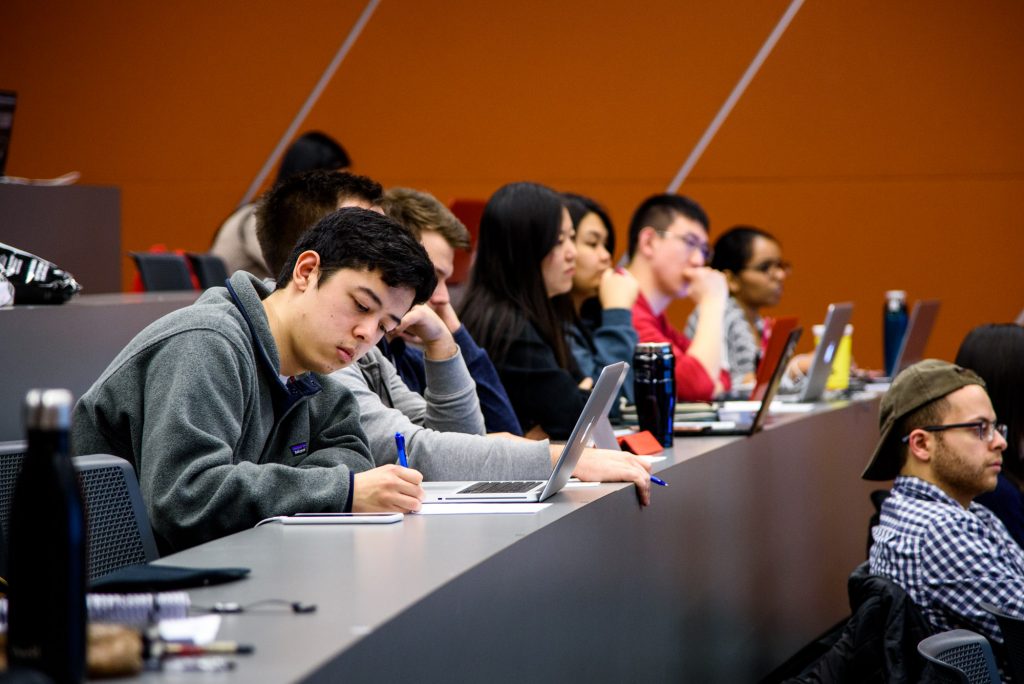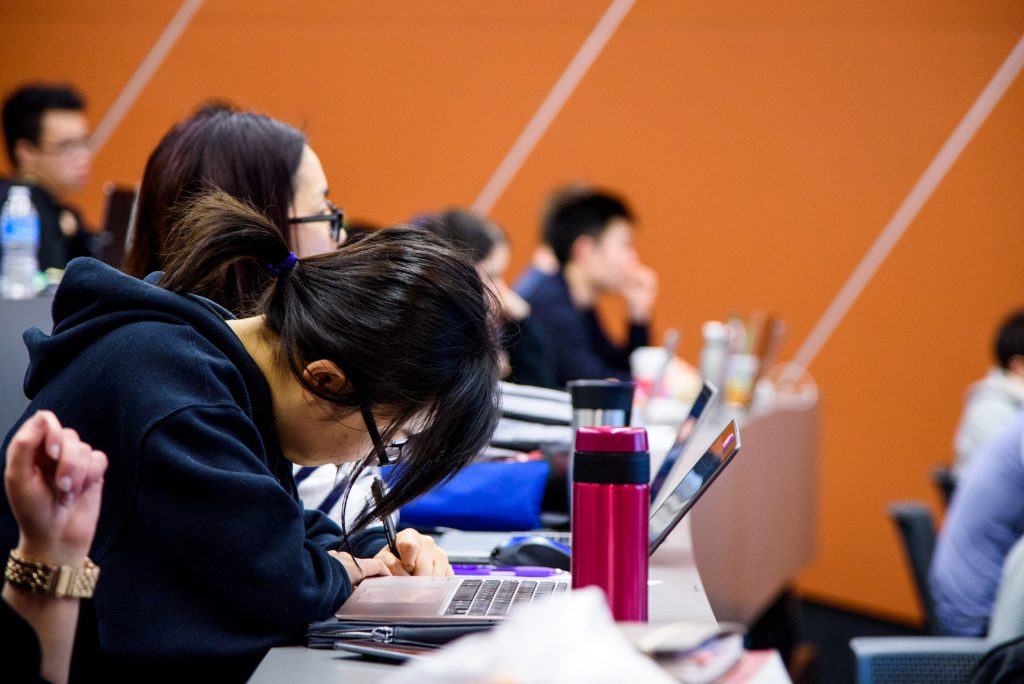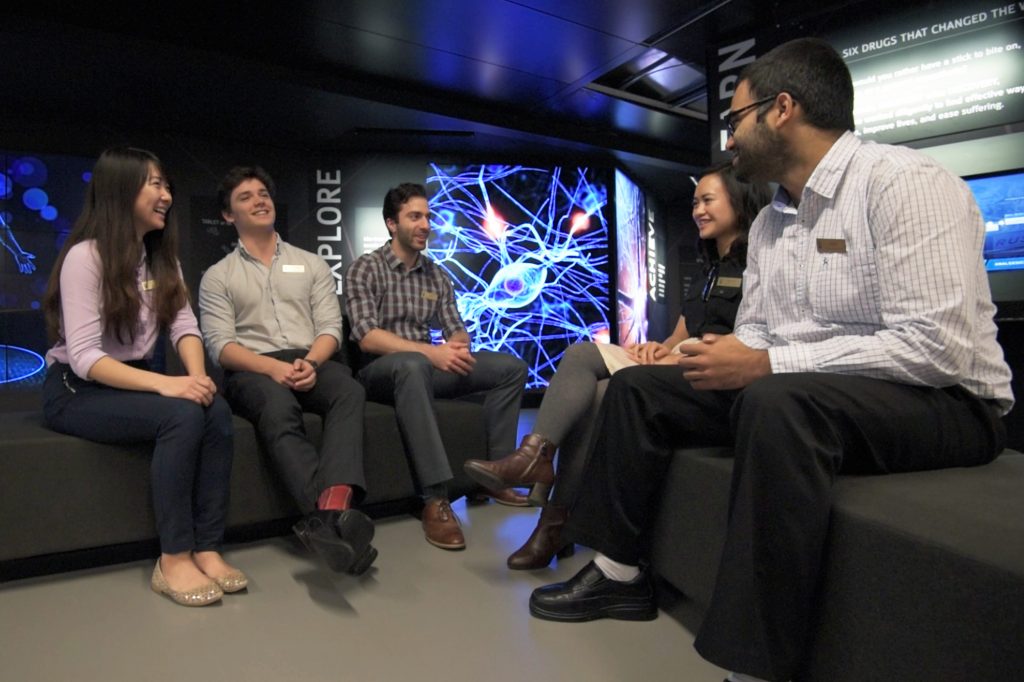Happy New Year everyone! It’s time to focus on your studies again. Rather than talking about setting a New Year’s goal, I would like to talk to students who have a habit of setting sky high goals, and are continually adding to the long list of achievements they would like to accomplish.
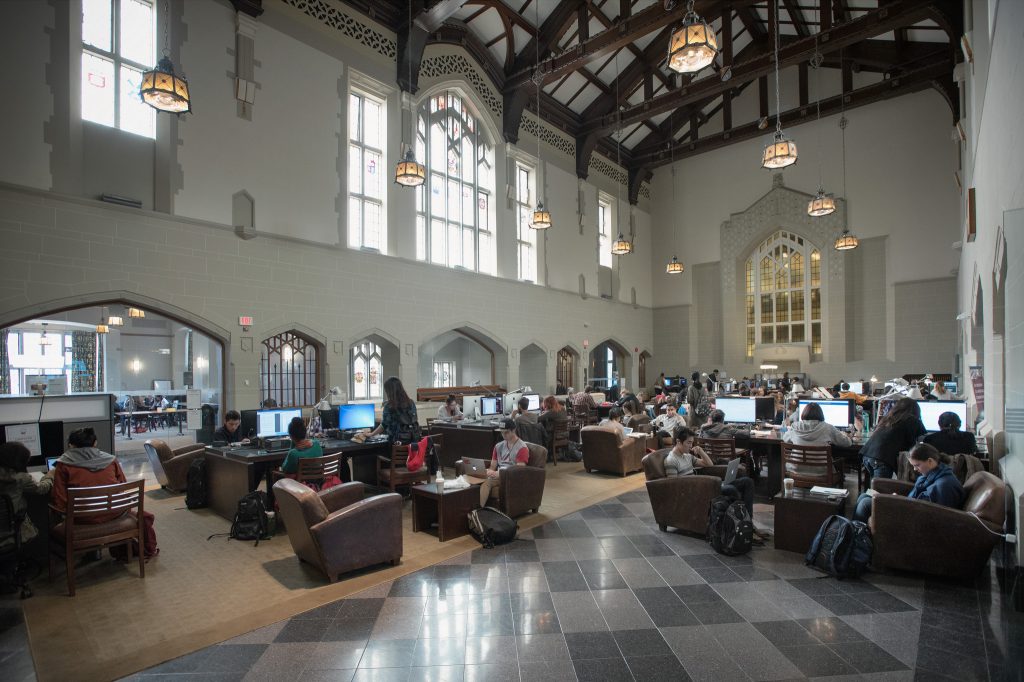
Students in the UBC Irving K Barber Learning Centre. Image credit: Martin Dee / UBC Communications & Marketing.
This blog post is for students that fall into the perfectionist category, and chances are you can identify if you fall into that category even a little. I spoke with Rachel Vella-Zarb and Alex Daros from UBC Counselling Services to find out more about perfectionism and how we can move towards a healthier work ethic.
What are some characteristics or habits of a perfectionist?
Whether we are aware of it or not, we all evaluate how worthwhile we think we are as person based on some kind of personal evaluation system. We may think we are a worthwhile person if we are kind or helpful, we may think we are worthwhile if we are attractive or thin, we may think we are worthwhile if we have a good job or make a significant amount of money.
In perfectionism, self-worth is based largely on achievement or performance. Perfectionism involves setting excessively high personal standards and striving to meet them at all costs. Along with these high standards, perfectionists often don’t take into account that setbacks and mistakes are normal and a part of learning. They may also have difficulty when emotions and motivation fluctuate. When standards are not met, perfectionists become highly self-critical. This then pushes them to set even higher standards or avoid trying entirely. When standards are (temporarily) met, perfectionists often experience minimal satisfaction from these achievements. Instead, meeting their goal is often dismissed as meaning the goal was “too easy,” and higher standards are then set.
What are some characteristics or habits of someone with a healthy work ethic?
When it comes to a “healthy pursuit of excellence” as opposed to perfectionism, self-worth is based on several different factors, not just performance. For example, achievement may be very important to someone but it may also important to them to be a good sister, friend, or daughter. When high standards are set, they are high but not objectively excessively high.
If standards are met, that person takes pride and satisfaction in this accomplishment by celebrating their success. If standards are not met, the person considers what went wrong and revises their goals or problem solves for next time. A healthy mindset means accepting that mistakes and even failures are possible and we can learn from these moments. A healthy work ethic means aiming for “very good,” not flawless. It also means distributing time and energy across different areas of importance, not putting it all into work. It involves recognizing that it’s normal for emotions to fluctuate and it is important to take care of oneself during stressful times.
What are some reasons a person may be a perfectionist?
Some people are more perfectionistic than others for a variety of reasons. It may be in part due to genetics, and in part due to learning from others (e.g., parents, teachers, siblings). Many people who are perfectionistic have been rewarded for their efforts and achievements and therefore place emphasis on this area of their life. They may have learned to set high goals and work towards them but find that over time, their standards become higher and higher and self-criticism becomes more and more demanding to the point where it is not helpful and instead causes problems. Over time, perfectionism is maintained by rigid standards, emphasis on achievement, discounting successes, overemphasizing setbacks, and frequent negative self-evaluation and self-criticism.
How can we move from perfectionism to a more healthy work ethic?
Perfectionists are often reluctant to make changes because they fear “lowering their standards.” Changing perfectionism is not about lowering standards, but rather it is about considering ways that achievement can be better met and considering whether it’s helpful to base self-worth so heavily on achievement. Many people believe that the harder you work, the better you do; actually, research indicates that that with too much effort, performance tails off or doesn’t get incrementally better.
People who want to adjust their perfectionistic behaviours may want to work on two main areas: (1) their thoughts or self-talk and (2) their behaviours. From a cognitive perspective, you can begin by talking to yourself as if you were a good coach. A good coach doesn’t offer constant criticism or set higher and higher goals, rather a good coach offers positive feedback and constructive suggestions. When you catch yourself setting high standards or evaluating yourself negatively, you can ask “are these expectations reasonable given the circumstances?” “what are the costs and benefits of pursuing this goal in this way?” and “what would I say to someone I was mentoring or coaching if they felt this way?”
Another strategy is to be mindful of what’s going well in your life, as perfectionists often tend to discount successes. One way to challenge this attitude is to keep track of three good things per day (big or small). Keep these good things recorded on a piece of paper and continue to follow-up by adding new things each day. This can become a good motivational piece when displayed in your office or where you study.
From a behavioural perspective, you can begin to look at some of the behaviours that maintain perfectionism, for example over-preparing, re-reading, repeated checking, or excessive planning. Once you’ve identified these areas, you can try some behavioural experiments where you work for one week at your current level of effort, and then one week at 80% effort, and compare the outcomes. For example, if you notice that you tend to re-read emails at least three times to scan them for errors before sending them, try doing this for one week and record the outcomes (i.e., how many mistakes you make that others notice and how many mistakes you make that have significant outcomes). Then spend the next week re-reading emails once and note the same outcomes. Figuring out how to cut back time spent on lower priority tasks is an important part of being efficient.
For some additional work on perfectionism, check out the following book recommendations:
Antony, M.M., & Swinson, R. (2009). When perfect isn’t good enough: Strategies for coping with perfectionism (2nd edition). New Harbinger Publications.
Ben-Shahar, T. (2010). Being happy: you don’t have to be perfect to lead a richer, happier life. McGraw-Hill.
###
If this blog post resonates with you, why not give some of these suggestions a try this year! After reading through Rachel and Alex’s advice, I think it would be helpful to write down your thought patterns about grades and studying, and also write down what your goals are in school and extracurricular involvement. Once you’ve written your goals and thought patterns, you can experiment with what a reasonable goal could be. You can also identify your common thought patterns, making it easier to see them creep up while studying.
What would happen if you studied and worked on assignments without the sky-high goals? Experimenting with ways to move into a healthier work ethic can help you in your studying, career, and personal life for years to come.
Wishing you all ease and happiness in 2017!
– Karie Hanson. Karie is the Program Advisor and Manager for the Faculty of Pharmaceutical Sciences. She is originally from Sherwood Park, Alberta, and graduated from the University of Alberta with a Bachelor of Arts in Recreation, Sport and Tourism. Outside of work, Karie enjoys playing baseball, basketball, walking the seawall, and volunteering with older adults.
If you feel that you need some additional support and would like to speak with a counsellor, you can visit UBC Counselling Services during their drop-in hours to meet with a Wellness Advisor. There are two Counselling Services locations on campus, and you can find their contact information, drop-in hours, and general information here.

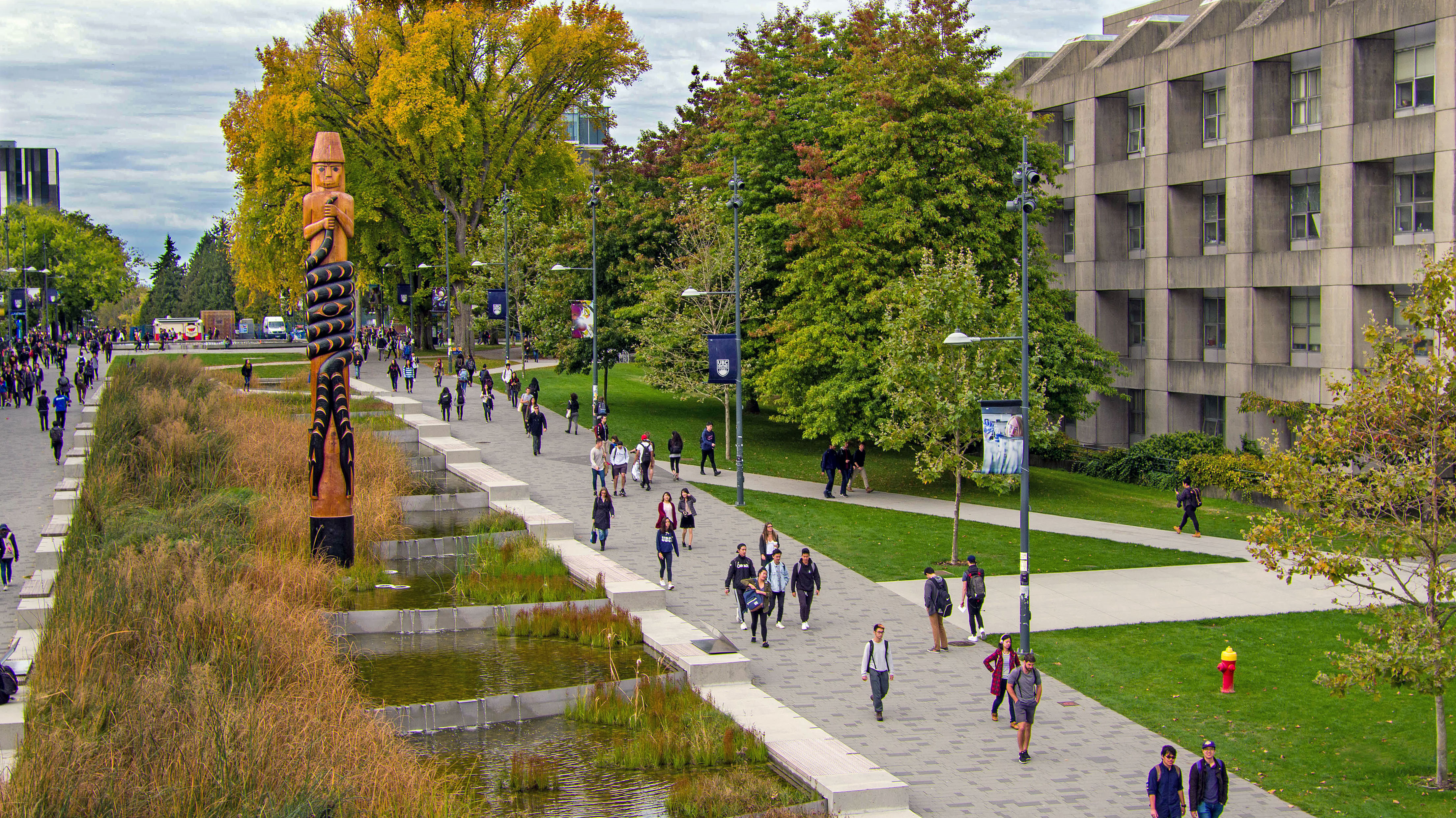
 Follow
Follow

